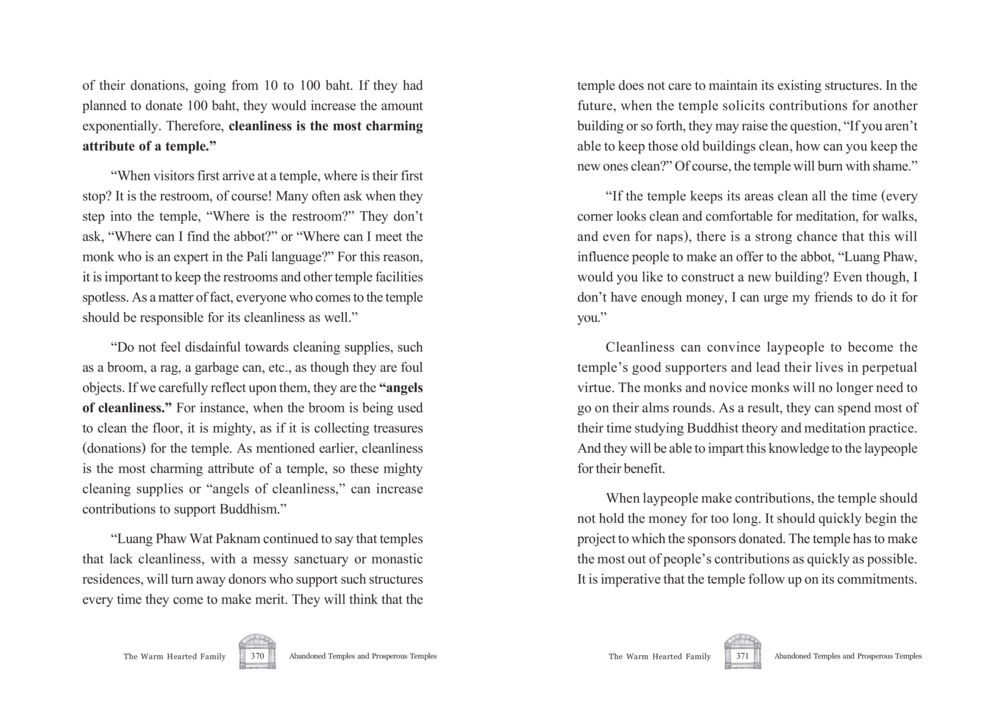The Importance of Cleanliness in Temples : หน้า 186/207
The Warm Hearted Family : หน้า 186/207 Exploring how cleanliness in temples influences donations and community support.
0 ครั้ง

สรุปเนื้อหา
ความสะอาดเป็นคุณสมบัติที่ดึงดูดสำคัญที่สุดของวัด เมื่อผู้เข้าชมมาถึงวัดแห่งแรกที่พวกเขาสงสัยคือห้องน้ำ ดังนั้นการรักษาสถานที่ให้สะอาดจึงเป็นสิ่งสำคัญมาก การดูแลความสะอาดส่งผลต่อความสนใจของผู้บริจาคมากมาย วัดที่มีสภาพแวดล้อมรกจะทำให้ผู้บริจาคลังเลต่อการสนับสนุน อีกทั้งความสะอาดยังช่วยสร้างบรรยากาศที่ดีตั้งแต่การทำสมาธิไปจนถึงการสนับสนุนการสร้างสิ่งใหม่ ด้วยความรับผิดชอบในการรักษาความสะอาด วัดสามารถสร้างผู้สนับสนุนที่ดีและช่วยให้พระสงฆ์มีเวลามากขึ้นในการศึกษาและฝึกปฏิบัติศาสนา.
หัวข้อประเด็น
-ความสำคัญของความสะอาดในวัด
-ผลกระทบต่อการบริจาค
-การสนับสนุนและทำบุญ
-ความรับผิดชอบในการรักษาความสะอาด
-การศึกษาและการปฏิบัติของพระสงฆ์
ข้อความต้นฉบับในหน้า
of their donations, going from 10 to 100 baht. If they had planned to donate 100 baht, they would increase the amount exponentially. Therefore, cleanliness is the most charming attribute of a temple.”
“When visitors first arrive at a temple, where is their first stop? It is the restroom, of course! Many often ask when they step into the temple, “Where is the restroom?” They don’t ask, “Where can I find the abbot?” or “Where can I meet the monk who is an expert in the Pali language?” For this reason, it is important to keep the restrooms and other temple facilities spotless. As a matter of fact, everyone who comes to the temple should be responsible for its cleanliness as well.”
“Do not feel disdainful towards cleaning supplies, such as a broom, a rag, a garbage can, etc., as though they are foul objects. If we carefully reflect upon them, they are the “angels of cleanliness.” For instance, when the broom is being used to clean the floor, it is mighty, as if it is collecting treasures (donations) for the temple. As mentioned earlier, cleanliness is the most charming attribute of a temple, so these mighty cleaning supplies or “angels of cleanliness,” can increase contributions to support Buddhism.”
“Luang Phaw Wat Paknam continued to say that temples that lack cleanliness, with a messy sanctuary or monastic residences, will turn away donors who support such structures every time they come to make merit. They will think that the temple does not care to maintain its existing structures. In the future, when the temple solicits contributions for another building or so forth, they may raise the question, “If you aren’t able to keep those old buildings clean, how can you keep the new ones clean?” Of course, the temple will burn with shame.”
“If the temple keeps its areas clean all the time (every corner looks clean and comfortable for meditation, for walks, and even for naps), there is a strong chance that this will influence people to make an offer to the abbot, “Luang Phaw, would you like to construct a new building? Even though, I don’t have enough money, I can urge my friends to do it for you.”
Cleanliness can convince laypeople to become the temple’s good supporters and lead their lives in perpetual virtue. The monks and novice monks will no longer need to go on their alms rounds. As a result, they can spend most of their time studying Buddhist theory and meditation practice. And they will be able to impart this knowledge to the laypeople for their benefit.
When laypeople make contributions, the temple should not hold the money for too long. It should quickly begin the project to which the sponsors donated. The temple has to make the most out of people’s contributions as quickly as possible. It is imperative that the temple follow up on its commitments.
Tags : #ความสะอาด #วัด #การบริจาค #การสนับสนุน #ทำบุญ
หน้าหนังสือทั้งหมด

1

2

3

4

5

6

7

8

9

10

11

12

13

14

15

16

17

18

19

20

21

22

23

24

25

26

27

28

29

30

31

32

33

34

35

36

37

38

39

40

41

42

43

44

45

46

47

48

49

50

51

52

53

54

55

56

57

58

59

60

61

62

63

64

65

66

67

68

69

70

71

72

73

74

75

76

77

78

79

80

81

82

83

84

85

86

87

88

89

90

91

92

93

94

95

96

97

98

99

100

101

102

103

104

105

106

107

108

109

110

111

112

113

114

115

116

117

118

119

120

121

122

123

124

125

126

127

128

129

130

131

132

133

134

135

136

137

138

139

140

141

142

143

144

145

146

147

148

149

150

151

152

153

154

155

156

157

158

159

160

161

162

163

164

165

166

167

168

169

170

171

172

173

174

175

176

177

178

179

180

181

182

183

184

185

186

187

188

189

190

191

192

193

194

195

196

197

198

199

200

201

202

203

204

205

206

207
หนังสือที่เกี่ยวข้อง
Load More
